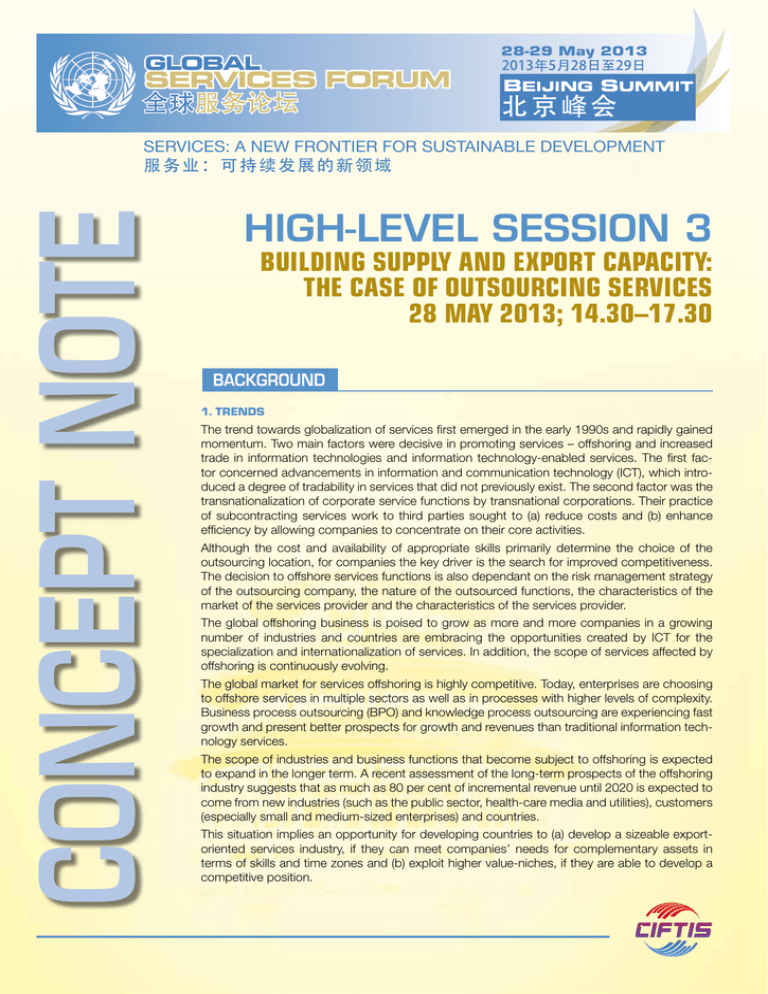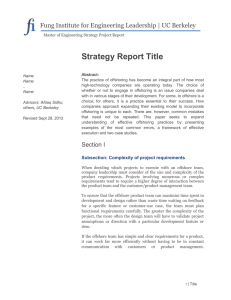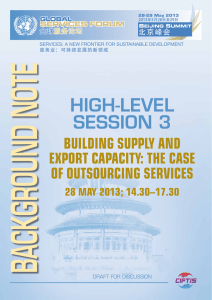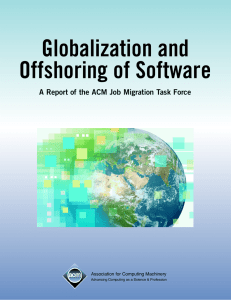HIGH-LEVEL SESSION 3 Building Supply and Export CapaCity: 28 May 2013; 14.30–17.30
advertisement

28-29 May 2013 CONCEPT NOTE SERVICES: A NEW FRONTIER FOR SUSTAINABLE DEVELOPMENT 服务 业:可持续发展的 新 领 域 HIGH-LEVEL SESSION 3 Building Supply and Export Capacity: The Case of Outsourcing Services 28 May 2013; 14.30–17.30 BACKGROUND 1. Trends The trend towards globalization of services first emerged in the early 1990s and rapidly gained momentum. Two main factors were decisive in promoting services – offshoring and increased trade in information technologies and information technology-enabled services. The first factor concerned advancements in information and communication technology (ICT), which introduced a degree of tradability in services that did not previously exist. The second factor was the transnationalization of corporate service functions by transnational corporations. Their practice of subcontracting services work to third parties sought to (a) reduce costs and (b) enhance efficiency by allowing companies to concentrate on their core activities. Although the cost and availability of appropriate skills primarily determine the choice of the outsourcing location, for companies the key driver is the search for improved competitiveness. The decision to offshore services functions is also dependant on the risk management strategy of the outsourcing company, the nature of the outsourced functions, the characteristics of the market of the services provider and the characteristics of the services provider. The global offshoring business is poised to grow as more and more companies in a growing number of industries and countries are embracing the opportunities created by ICT for the specialization and internationalization of services. In addition, the scope of services affected by offshoring is continuously evolving. The global market for services offshoring is highly competitive. Today, enterprises are choosing to offshore services in multiple sectors as well as in processes with higher levels of complexity. Business process outsourcing (BPO) and knowledge process outsourcing are experiencing fast growth and present better prospects for growth and revenues than traditional information technology services. The scope of industries and business functions that become subject to offshoring is expected to expand in the longer term. A recent assessment of the long-term prospects of the offshoring industry suggests that as much as 80 per cent of incremental revenue until 2020 is expected to come from new industries (such as the public sector, health-care media and utilities), customers (especially small and medium-sized enterprises) and countries. This situation implies an opportunity for developing countries to (a) develop a sizeable exportoriented services industry, if they can meet companies’ needs for complementary assets in terms of skills and time zones and (b) exploit higher value-niches, if they are able to develop a competitive position. A new geography of offshoring has emerged in the past few years. New dynamic exporters encompass countries from the developed and developing world. In this new geography, the most dynamic exporters of information technologies and information technology-enabled services appear to be concentrated in selected developing countries in Asia, the Russian Federation, some European Union countries and some transition economies. In the developing world, a number of countries in Africa, Latin America and the Caribbean are reporting important export shares gains, revealing their increased attractiveness for the provision of various business services. 2. Ensuring development gains from participation in the global offshoring market The spread of international outsourcing of services has been a major force shaping the services trade and investment landscape during the last decade, offering potential benefits for developing countries. However, it also presents governments and business with challenges. There are two main challenges affecting countries that desire to capture greater opportunities from the global services offshoring market. The first one is related to attracting the clients; the second one is related to maximizing potential positive effects and minimizing potential negative effects. Research by UNCTAD shows that governments have a fundamental role to play to ensure companies in developing countries benefit from the existing opportunities in outsourcing and offshoring markets. To ensure that offshoring of services can contribute to achieving development objectives, strategies aimed at the promotion of such services should be embedded in the broader development strategy. Supporting services offshoring can relate to different policy spheres, for example investment, technology and innovation, and industrial policies. In order to maximize benefits, these policy spheres should be coherent. Four policy areas are crucial to building domestic capacity in offshored services – infrastructure, human and business skills, the policy framework and the regulatory framework – to achieve the following objectives: • Access to competitively priced high-speed internet connectivity lines; • Promoting requisite skills to develop the sector, establishing a standard to certify the quality of skills provided and attracting people to be certified and deployed in the sector. At the personal level, these skills may include English, computer literacy, basic customer orientation and behaviour, knowledge that is specific to the BPO function and skills that enable the undertaking of tasks that are more sophisticated. At the business level, such skills may refer to entrepreneurship and managerial competencies, problem solving and communication skills, and legal skills to negotiate offshoring services contracts; • Implementing support measures can help ensure that benefits of developing a BPO industry actually materialize – such support measures may include: fiscal incentives and financial support or cluster development policies; • An enabling regulatory framework that facilitates business operations, ensures contract stability, protection of private data and protection of intellectual property, and defines and enforces labour standards and promote competition. Promoting exports of offshored services is mainly about marketing. Key areas for action to capture offshoring opportunities relate to promotion of existing opportunities to potential investors, building business partnerships and developing awareness of the offer of local services providers. In promoting these exports through offshoring, recognition of increased interlinkages among modes of supplying services is necessary. This aspect is also of relevance to trade negotiations strategies and to the identification of barriers to trade in these services and to address them effectively. Issues to be considered Against this backdrop, High-level Session 3 seeks to promote a debate on the role of policy action to maximize development gains from outsourcing. Discussions will: • Examine recent trends in outsourcing and offshoring in services sectors with a view to: - Identifying success factors in the policies to develop supply and export capacities for outsourcing and offshoring in services; - Identifying success factors to overcome the main challenges faced in the path to develop services sectors through outsourcing and offshoring. For more information unctad.org/gsf2013 gsf@unctad.org Follow us on https://twitter.com/unctadgsf








